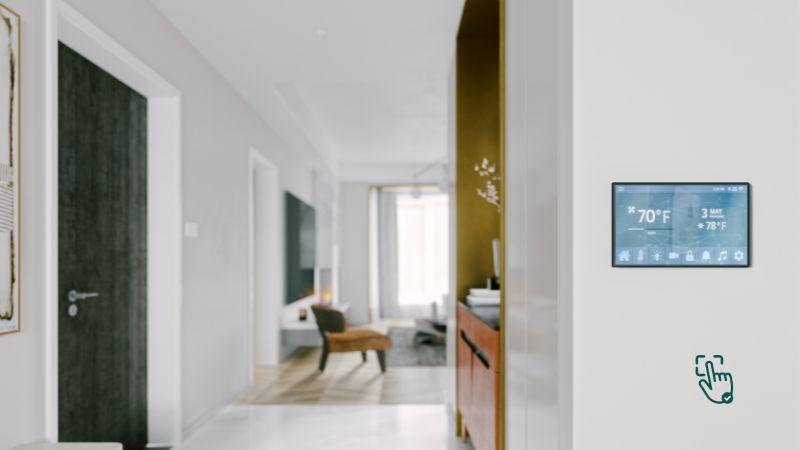
Ready to make your home smarter and save on energy bills? A smart thermostat can optimize your home’s temperature settings, cut down on energy use, and even adapt to your schedule for ultimate convenience. In this guide, we’ll dive deep into the best smart thermostats out there, from top-rated options like Nest to budget-friendly picks that get the job done. Let’s take the guesswork out of finding the best thermostat for your home with our detailed rundown!
What Is a Smart Thermostat, and Why Should You Consider One?
A smart thermostat goes beyond regular temperature control. It’s a device that learns your habits, integrates with your smart home system, and adjusts settings for maximum efficiency. Imagine coming home to a perfectly cozy environment without touching a single button! Plus, many models connect to your Wi-Fi, allowing you to adjust settings from your phone, even when you’re not home. Not only is this super convenient, but it can also lead to impressive savings on your energy bills.
Why Get a Smart Thermostat?
Convenience, savings, and control – these are the three main reasons people are switching to smart thermostats. If you have a busy schedule or want to reduce your energy costs without sacrificing comfort, a smart thermostat is a game-changer. But with so many options on the market, each with unique features, finding the best one can feel overwhelming.
Best Smart Thermostats to Buy in 2025
A smart thermostat isn’t just a fancy upgrade—it’s a total game-changer for home comfort and energy savings. Whether you’re trying to cut down on those skyrocketing electricity bills or just want a thermostat that actually knows what you like, there’s something out there for you. The latest smart thermostats in 2025 come with insane features like AI-driven learning, voice control, app integration, and energy efficiency tracking. But which one is worth your money? Let’s break down the best options, from high-end models to budget-friendly picks.
1. Google Nest Learning Thermostat – The Smartest Choice
The Google Nest Learning Thermostat isn’t just smart—it’s practically a mind reader. Unlike traditional thermostats that need constant adjusting, this one learns your schedule within a few days and automatically adjusts to your routine. Wake up at 7 AM and like your home at a cozy 72°F? Nest will remember. Head out to work by 9? It’ll switch to energy-saving mode to keep your bills in check. And by the time you return, it ensures your home is at the perfect temperature without you even touching it.
Why People Love It:
✅ Learns your routine – No more manual adjustments.
✅ Sleek, modern design – Looks amazing on any wall.
✅ Energy-saving reports – Helps you cut down on waste.
✅ Compatible with Google Home & Alexa – Voice control ready.
✅ Remote control via app – Adjust your home’s temperature from anywhere.
But Here’s the Catch:
❌ Expensive – One of the pricier models out there.
❌ Setup can be tricky – Might require professional installation.
Despite the cost, the Google Nest Learning Thermostat is a favorite among homeowners because it pays for itself over time through energy savings. If you want a hands-free, learning thermostat that works with you, this is one of the best investments you can make.
2. ecobee SmartThermostat with Voice Control – The All-in-One Smart Home Hub
Looking for a thermostat that does more than just control temperature? The ecobee SmartThermostat with Voice Control is a powerhouse. It’s not just a smart thermostat—it’s a voice assistant, a room sensor, and a home automation tool all rolled into one. With built-in Alexa, you can literally talk to your thermostat and control other smart devices in your home. Want to dim the lights while adjusting the temperature? Done. Need to check the weather? Just ask your thermostat.
Why People Love It:
✅ Built-in Alexa – Works like an Amazon Echo device.
✅ Room sensor included – Adjusts temperature based on occupancy.
✅ Multi-platform compatibility – Works with Google Assistant, Apple HomeKit, and Alexa.
✅ Smart automation – Can work alongside other smart home gadgets.
✅ Energy savings – Uses AI to cut down on unnecessary heating/cooling.
But Here’s the Catch:
❌ Not cheap – Definitely on the premium side.
❌ Room sensors need fine-tuning – Sometimes require manual calibration.
If you’re already using Alexa and want a thermostat that doubles as a smart home assistant, ecobee is a fantastic choice. It’s perfect for people who love home automation, convenience, and voice control integration. Just keep in mind that it costs more, but for the features it offers, it’s totally worth it.
3. Honeywell Home T9 Smart Thermostat – Best Budget-Friendly Smart Thermostat
The Honeywell Home T9 is all about simplicity and affordability while still offering smart features and voice control. It might not have the AI-driven learning of Nest, but it makes up for it with a user-friendly app, multi-room sensors, and compatibility with major smart home systems like Alexa, Google Assistant, and Samsung SmartThings.
Why People Love It:
✅ Affordable compared to high-end models – Great value for the features.
✅ Easy-to-use mobile app – Simple and intuitive.
✅ Multi-room sensors – Helps regulate temperature in different areas.
✅ Compatible with Alexa & Google Assistant – Voice control enabled.
✅ Reliable and energy-efficient – Helps reduce power consumption.
But Here’s the Catch:
❌ Limited learning capabilities – Doesn’t adapt to your schedule like Nest.
❌ Room sensors can be inconsistent – Accuracy isn’t always spot on.
For those who want a solid, budget-friendly smart thermostat, the Honeywell T9 is a great pick. It doesn’t overcomplicate things and still integrates well with popular smart home ecosystems. If you want a straightforward smart thermostat without spending a fortune, this is a fantastic choice.
4. Amazon Smart Thermostat – The Best Entry-Level Smart Thermostat
If you’re just dipping your toes into smart home tech and want an affordable yet reliable smart thermostat, the Amazon Smart Thermostat is worth considering. It’s a no-frills, basic smart thermostat that’s designed to be simple, easy to use, and Alexa-compatible.
Why People Love It:
✅ Super budget-friendly – One of the cheapest smart thermostats available.
✅ Alexa-enabled – Perfect for Amazon smart home users.
✅ Straightforward setup – No professional installation needed.
✅ Basic energy-saving features – Helps cut down on unnecessary heating/cooling.
But Here’s the Catch:
❌ Limited compatibility – Doesn’t work well with Google or Apple smart home systems.
❌ Lacks learning features – Doesn’t adapt to your habits.
The Amazon Smart Thermostat is ideal for those who don’t need fancy features but still want the convenience of smart temperature control. It’s perfect for people who already use Alexa and want an affordable way to upgrade their home.
How to Pick the Best Smart Thermostat for Your Home
Selecting a smart thermostat involves considering factors like compatibility, installation, and ease of use.
- Compatibility with Your HVAC System
- Not all smart thermostats are compatible with every HVAC system. Check if your heating and cooling setup works with the thermostat you’re interested in. For instance, Nest and ecobee models tend to be compatible with a wide range of systems, but Amazon’s thermostat may have some limitations.
- Smart Home Integration
- If you already use a smart home ecosystem like Google Home, Apple HomeKit, or Amazon Alexa, make sure your thermostat of choice will integrate smoothly. Some thermostats, like the ecobee, even come with built-in voice control, which is a bonus.
- Learning Capabilities
- Thermostats like the Nest Learning Thermostat pick up on your habits and automatically adjust the temperature based on your routines. If convenience and automation are essential, consider these learning thermostats for a truly hands-free experience.
- Ease of Installation
- Some thermostats are DIY-friendly, while others may need a professional setup, especially if they require a C-wire. Nest, for example, often needs a C-wire for consistent performance, so be sure to factor installation requirements into your decision.
Are Smart Thermostats Worth It?
The short answer is yes, especially if you value convenience and energy savings. Many smart thermostats offer reports that show how much energy you’re using and where you could save more. However, not every feature will be useful to every user. If you only want remote control of your thermostat without added bells and whistles, a simpler, less expensive model may be all you need.
Pros and Cons of Smart Thermostats: Honest Breakdown
Pros:
- Energy Savings: Smart thermostats can significantly reduce your energy usage by only heating or cooling when needed.
- Remote Control: Adjust settings from anywhere, making it easy to come home to a comfortable temperature.
- Smart Home Integration: They work with voice assistants and other smart home products.
- Learning Abilities: Some models, like the Nest, learn your preferences for ultimate convenience.
Cons:
- Initial Cost: High-quality smart thermostats can be pricey upfront.
- Setup Complexity: Certain models may require professional installation, especially if your system needs a C-wire.
- Sensor Inconsistency: Some thermostats struggle with keeping room sensors accurate, which can lead to inconsistent temperatures.
Conclusion
Which Smart Thermostat Should You Buy?
Your ideal smart thermostat depends on your budget, home compatibility, and the level of control you want. Here’s a quick summary:
- Best Overall: Nest Learning Thermostat for top-notch learning features and energy reports.
- Best for Voice Control: ecobee SmartThermostat with Voice Control is ideal for smart home enthusiasts who want Alexa in their thermostat.
- Best Budget Option: Amazon Smart Thermostat provides all the basics at an affordable price.



